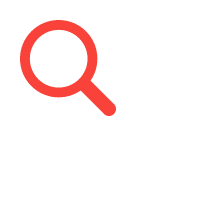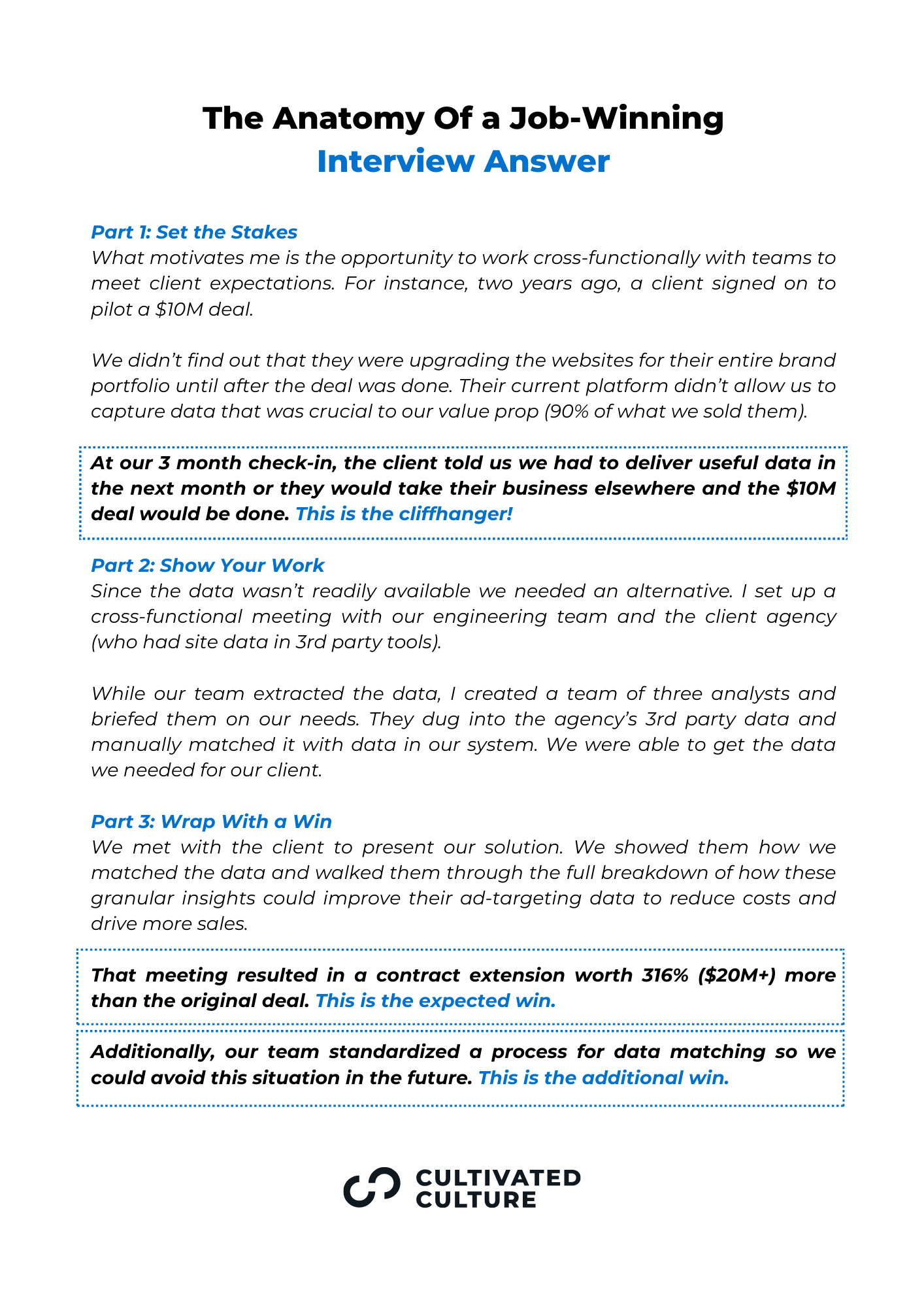Looking to ace the Recruiter interview questions for the role you are applying for?
Then you’ll need to start gearing up!
Some questions addressed during interviews are universal for any role. They’re usually questions like:
- Why do you want to work here?
- What is your greatest weakness?
- What motivates you?
- Where do you see yourself in 5 years?
However, if you are seeking where to find recent interview questions for a Recruiter position, look no further than this article. We’ve wrapped up the most common, role-specific questions that you’ll need for your Recruiter interview.
In this guide, you will learn:
- What Companies Are Looking For When Hiring a Recruiter
- The Anatomy Of A Job-Winning Recruiter Interview Answer
- 10+ Recruiter Interview Questions And Answers
- How To Turn This Recruiter Interview Into An Offer
Let’s dive in!
What Companies Are Looking For When Hiring A Recruiter
What do companies look for when they're hiring a Recruiter?
When hiring a Recruiter, companies look for candidates with strong interpersonal and communication skills with a keen eye for talent.
The most required skills companies look for in a Recruiter are:
- Communication: The ability to clearly and persuasively communicate with candidates, hiring managers, and other stakeholders.
- Active Listening: Understanding the needs and concerns of candidates and hiring managers.
- Sales And Marketing: The ability to sell the company and the job to potential candidates.
- Relationship Building: Building strong relationships with candidates, hiring managers, and other stakeholders.
- Attention To Detail: Ensuring all aspects of the recruitment process are handled accurately.
- Negotiation Skills: The ability to negotiate the compensation package between candidates and employers, leading to mutually satisfactory agreements.
- Time Management: Managing multiple candidates and job positions simultaneously.
- Technical Aptitude: Proficiency with tools like Applicant Tracking Systems (ATS), social media, and other recruitment software.
- Analytical Skill: The ability to analyze data related to recruitment metrics, such as time-to-hire, cost-per-hire, and source effectiveness.
- Emotional Intelligence: The ability to understand and manage one's emotions, as well as empathizing with others.
If you are walking into an interview for a Recruiter role, you’ll need to be prepared to answer these questions in a way that shows you have mastered the most important skills required for the position. This goes way beyond simple, one-sentence answers. Let’s break it down in the next section.
The Anatomy Of A Job-Winning Recruiter Interview Answer
Remember this: every question you’re asked during an interview rarely asks for a basic answer.
For instance, let’s say the hiring manager asks you what motivates you.
Sure, you could answer something like “What motivates me is working in cross-functional roles”.
Or…
You could go with something like this:
“What motivates me is the opportunity to work cross-functionally with teams to meet client expectations. For instance, two years ago, a client signed on to pilot a $10M deal. We didn’t find out that they were upgrading the websites for their entire brand portfolio until after the deal was done.
Their current platform didn’t allow us to capture data that was crucial to our value prop (90% of what we sold them). At our 3 month check-in, the client told us we had to deliver useful data in the next month or they would take their business elsewhere and the $10M deal would be done.
Since the data wasn’t readily available we needed an alternative. I set up a cross-functional meeting with our engineering team and the client agency (who had site data in 3rd party tools). While our team extracted the data, I created a team of three analysts and briefed them on our needs. They dug into the agency’s 3rd party data and manually matched it with data in our system.
We were able to get the data we needed for our client. We met with the client to present our solution. We showed them how we matched the data and walked them through the full breakdown of how these granular insights could improve their ad-targeting data to reduce costs and drive more sales.
That meeting resulted in a contract extension worth 316% ($20M+) more than the original deal.
Additionally, our team standardized a process for data matching so we could avoid this situation in the future.”
Much better, right?!
If you find this approach a bit daunting and you’re getting chills just by thinking about how you’ll craft a thorough answer, don’t worry, because I have news for you.
The truth of the matter is this answer actually follows a secret framework many candidates are unaware of. It’s called…
The 4-Part Framework of a Job-Winning Interview Answer
The example above follows a specific framework that breaks down into four parts:
Part #1: Tie Directly to The Role
This part doesn’t actually go into the answer, but it is the first action you should take when preparing for interviews. Before you begin crafting your answer, make sure that the example and story chosen tie back to the specific qualifications and goals required for the role.
This exercise will help:
- Find 10+ job descriptions that align with your target role
- Review each job description for skills and qualifications
- Add each new skill to a spreadsheet. For each repeat skill, add a +1 in the column next to the skill
- Sort from Highest to Lowest in the frequency column
Use the top 5-10 skills as the basis for the examples and answers you choose to use in this process
Also, some recruiters might open your resume during the interview, so you'll want to make sure your resume matches the job description. Head over to ResyMatch.io to easily scan your resume and see how it matches the job description. Or, you can simply upload your resume and copy and paste the job description below, for free!
Part #2: Set The Stakes
Then, begin your answer by setting the stage and presenting the problem, issue, or opportunity you faced in the given situation. Outline the stakes, such as the wins and losses you would probably face with a positive or negative outcome, then hook your listeners with a cliffhanger.
Part #3: Show The Work
Walk the interviewer through your problem-solving process step-by-step and then include specific examples of skills and experiences the role requires.
Part #4 Wrap Up With A Win
Finish off by highlighting the wins that came from your work with measurable results!
Let’s analyze the example above:
How to Use the 4-Part Framework to Answer Recruiter Interview Questions
By using this technique, you’ll be able to answer most of the Recruiter interview questions, like:
How you prioritize tasks: Be sure to address a situation where you had to prioritize office tasks and explain your approach. Explain what the stakes were and how the company would benefit from your work. Then, walk through the steps you took to approach this challenge and the ultimate results you and your team achieved.
How you handle stress and pressure: State a situation where you had to deal with a stressful situation and what was at stake. Explain why you had to go down the path you took, go through the challenges you faced during this process, and walk through the results you achieved.
See?
This 4-part framework can be easily applied to nearly any question. And, by applying this technique, you’ll be able to show your value and prove you are the right fit for the role!
10+ Recruiter Interview Questions And Answers
Now that we’ve covered the anatomy of the job-winning interview answer, it’s time you learn what questions might pop up during the interview.
You may expect technical Recruiter interview questions and also more general behavioral questions. Let’s break them down below!
Recruiter Technical Interview Questions
Most technical questions will be aimed at understanding if you are fit for the challenges of the role given specific aspects of the company and the team you will be working with.
While they might vary depending on the role you are applying for, here are a few examples of Recruiter technical interview questions, with answers elaborated using the 4-part framework.
Question #1: Are you familiar with Applicant Tracking Systems (ATS)?
This question assesses your familiarity with recruitment software and the ability to manage candidate data efficiently.
Here’s how you could craft an answer:
Example Answer For Questions About ATS
“At FutureTech Solutions, we were scaling rapidly and needed an efficient way to manage the influx of job applications. Without a robust system, we risked losing track of qualified candidates and slowing down our hiring process, potentially delaying project timelines by weeks.
I spearheaded the implementation of a new ATS, configuring it to align with our recruitment workflow. I set up custom pipelines for each role, automated email responses, and integrated it with our job boards and company website. I trained the recruitment team on how to utilize the system for resume parsing, candidate tracking, and communication.
As a result, our time-to-hire decreased by 25%, and we increased our candidate engagement rate by 30%, leading to quicker fills for key positions and more satisfied candidates and hiring managers.“
Question #2: What sourcing tools and techniques do you use to find candidates?
This question evaluates your knowledge in sourcing methods, such as social media, job boards, and networking.
Here’s how you could craft an answer:
Example Answer For Questions About Sourcing Methods:
“At Innovate Inc., we faced the challenge of finding top-tier software engineers in a highly competitive market. Without effective sourcing, we risked project delays and increased costs due to high recruiter churn.
I employed a multi-channel sourcing strategy, using LinkedIn Recruiter, GitHub, and Stack Overflow to find passive candidates. I also utilized Boolean search techniques and built a talent pipeline through industry events and meetups. Additionally, I developed a referral program that incentivized current employees to refer qualified candidates.
This approach led to a 40% increase in our talent pool and reduced our cost-per-hire by 20%, ensuring that we consistently filled our roles with top talent while maintaining budget efficiency.“
Question #3: Can you walk me through your process for screening resumes and applications?
This question allows you to showcase your approach to identifying qualified candidates and managing the initial stages of the recruitment process.
Here's how you could craft an answer:
Example Answer For Questions About Screening Resumes And Applications
“At GreenTech Corp., we had an urgent need to fill a senior marketing role, and we received over 200 applications. Without an efficient screening process, we risked missing out on top candidates due to delayed responses.
I devised a detailed screening process starting with a keyword scan to identify resumes matching the job description. I then reviewed the shortlisted resumes for relevant experience, skills, and achievements. I conducted initial phone screens to further assess candidates' qualifications and cultural fit.
By implementing this process, we shortlisted 15 high-quality candidates within a week. Ultimately, we filled the position within three weeks, reducing our time-to-fill by 50% and ensuring we had the right talent to drive our marketing strategy forward.“
Question #4: How do you measure the effectiveness of your recruitment strategies?
A question allows you to showcase your ability to use metrics and data to improve the recruitment processes.
Here's how you could craft an answer:
Example Answer For Questions About Recruitment Strategy Effectiveness
“At BrightFuture Tech, we needed to optimize our recruitment process to keep up with rapid growth. Without effective measurement, we risked inefficiencies and high costs, potentially slowing down our expansion plans.
I implemented a set of key recruitment metrics, including time-to-hire, cost-per-hire, and candidate source effectiveness. Using an ATS, I tracked these metrics and analyzed the data monthly. For example, I found that social media campaigns were yielding higher-quality candidates than job boards.
By reallocating our budget towards more effective channels, we reduced our cost-per-hire by 25% and improved our time-to-hire by 15%. These adjustments helped us meet our aggressive hiring goals while maintaining quality and cost efficiency.“
Question #5: Can you tell me about a time when you had to fill in a difficult position and the steps you took to overcome this challenge?
This question allows you to showcase your problem-solving abilities when handling challenging recruitment situations.
Here's how you could craft an answer:
Example Answer For Questions About Challening Recruitment Situations
“At HealthTech Solutions, we needed to hire a Chief Data Scientist urgently. Without filling this role, our new product launch risked delays, potentially costing the company millions in lost revenue.
I began by conducting a thorough intake meeting with the hiring manager to understand the exact requirements. I then used a combination of executive search firms, industry networking, and targeted LinkedIn campaigns to source candidates. I conducted in-depth interviews and presented a shortlist of three highly qualified candidates within two weeks.
We successfully hired a top candidate who brought over 15 years of experience. This hire not only kept our product launch on track but also introduced innovative data strategies that enhanced our competitive edge.“
Recruiter Behavioral Interview Questions
Some questions won’t address specific skill sets, but rather behavioral aspects. Here are a few examples you might come across during your interview:
Question #1: Can you describe a time when you had to manage a high volume of job requisitions? How did you prioritize your tasks?
This question allows you to showcase your organization and time management skills.
Here's how you could craft your answer:
Example Answer For Questions About Prioritization
“At GlobalTech, we faced a sudden spike in hiring needs due to a new project launch, resulting in 30 open requisitions across various departments. Without effective prioritization, we risked missing critical deadlines and impacting project delivery.
I prioritized tasks by urgency and business impact, focusing first on roles directly affecting project timelines. I used a Kanban board to manage my workflow, ensuring transparency and effective time management. I also delegated lower-priority tasks to junior recruiters and provided them with clear guidelines.
This approach allowed us to fill the most critical roles within four weeks, maintaining project schedules and demonstrating our ability to adapt and meet high demand efficiently.“
Question #2: Can you describe a situation where you had deal with a difficult candidate or hiring manager?
This question will allow you to show your conflict resolution skills and emotional intelligence.
Here's how you could craft your answer:
Example Answer For Questions About Conflict Resolution
“At Innovate Solutions, I worked with a hiring manager who had high expectations and was often unresponsive. This lack of communication risked prolonging the hiring process and losing top candidates.
I scheduled a meeting to discuss their needs and concerns, emphasizing the importance of timely feedback. I also provided a structured interview guide to streamline their review process. Regular check-ins ensured we stayed aligned throughout the process.
By addressing his concerns and facilitating better communication, we filled the role within the required timeline, improving our collaboration and ensuring a smoother hiring process for future positions.“
Question #3: Can you describe a time when you successfully persuaded a candidate to accept a job offer?
This question will allow you to showcase your negotiation skills.
Here's how you could craft your answer:
Example Answer For Questions About Negotiation With Candidates
“At TechVision, we identified a top software developer who was considering multiple offers. Losing them would mean missing out on a critical skill set needed for an upcoming project.
I highlighted our company's unique culture, growth opportunities, and the impact they could have on our projects. I arranged for them to meet with the team and see our collaborative environment firsthand. Additionally, I worked with our HR team to offer a competitive salary and benefits package tailored to their needs.
They accepted our offer, and their contributions led to a 15% improvement in project efficiency and team performance, demonstrating the value of effective candidate engagement and negotiation.“
Question #4: How do you provide a positive candidate experience throughout the recruitment process?
This question allows you to show your approach to candidate care and relationship-building skills.
Here's how you could craft your answer:
Example Answer For Questions About Candidate Experience
“At FutureTech Innovations, we aimed to enhance our employer brand by providing a top-notch candidate experience. A poor experience could result in negative reviews and a diminished talent pool.
I developed a candidate-centric process, including clear communication at each stage, timely feedback, and personalized interactions. I implemented a feedback loop, asking candidates for their input on our process and making necessary adjustments.
As a result, our candidate satisfaction scores increased by 30%, and we saw a 20% rise in referral candidates, proving that a positive candidate experience can significantly boost our recruitment efforts and reputation.“
Question #5: Can you describe a time when you implemented a new recruitment strategy or process and the outcomes of this project?
This question allows you to showcase your initiative, creativity, and the ability to improve in recruitment processes.
Here's how you could craft your answer:
Example Answer For Questions About Innovative Recruitment Strategies
“At Creative Minds Agency, we needed to reduce our time-to-hire for creative roles, as delays were impacting project delivery and client satisfaction.
I introduced a collaborative hiring strategy, involving cross-functional teams in the recruitment process. I also leveraged social media and portfolio sites like Behance to source creative talent and hosted virtual hiring events to attract candidates.
These initiatives resulted in a 35% reduction in time-to-hire and a 25% increase in the quality of candidates hired, enabling us to meet client deadlines more effectively and enhancing our reputation as a dynamic, forward-thinking agency.“
Ready To Turn This Recruiter Interview Into An Offer?
Then leverage from a proven, all-in-one system for crazy effective job interview preparation.
The Interview Preparation System was designed to help you turn your next job interview into an offer and comes with 30+ lessons and 5 hours of content.
Join thousands of job seekers just like you and start 2026 in a job you love! Click here for more.





























